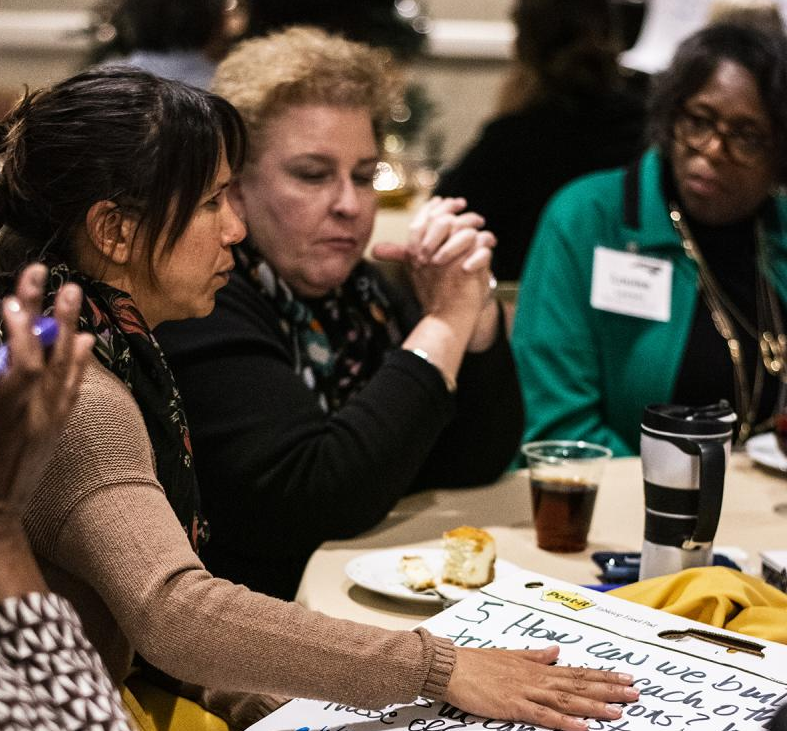
Pleased to have Maggie Woods report on the kick-off of a long-term effort on community reconnection. Maggie is a Policy and Program Manager at NC State University’s Institute for Emerging Issues.
Maggie:
North Carolinians are having increasing difficulty talking — and listening — to each other. That’s making it hard for us to get things done in our communities. And people want to find ways to fix that.
At least that’s what we heard, as my colleagues and I from NC State University’s Institute for Emerging Issues held “community conversations” across Western North Carolina this past summer.
From Buncombe to Clay to Wilkes counties — in coffee shops and at colleges — we met with 80 plus people to get their ideas about why it is so hard to connect to each other and how we can do better.
These conversations were part of our preparation for the Fall 2018 Emerging Issues Forum called ReCONNECT to Community, which was held in Asheville on Nov. 27. The Forum focused on how — and why — North Carolinians can get more involved in community life.
Why are People Disconnected?
Plenty of challenges emerged from our conversations as we met with people across the Western region. “People don’t have time to get involved,” said some. “People don’t know how to get involved,” said others. Some people lack transportation to participate. Others say negative reports in the media discourage them from participating. Some people reported that they didn’t feel their ideas or concerns were listened to.
North Carolina is not unique in facing these challenges. Nationally, only 31 percent of people agree that “most people can be trusted.” The percentage of North Carolinians who volunteer, 26 percent, is about average nationally.
Promising Community Initiatives for Stronger Connections
At the ReCONNECT to Community Forum, we wanted to acknowledge people’s feelings of disconnection and highlight community work that is getting things done. We particularly wanted to highlight North Carolina communities that were bringing people together to tackle key and pressing local challenges.
Through a comprehensive request for proposal process where we received an astonishing 32 applications from initiatives large and small across the state.
We chose five community initiatives to highlight at the forum. Each of these communities are trying new and innovative ways to bring people together to solve very different community challenges. And they are engaging a lot of people in the process.
The communities we chose were:
- Choosing Equity Series (Asheville)
- Explore Elkin (Elkin)
- Rural Opportunity Institute (Edgecombe County)
- One Team. One Goal. One Community (Elizabeth City)
- Thomas S. Kenan Institute for the Arts (Winston-Salem)
Lessons from Five Communities
We chose these communities because we were interested in how they are engaging community to solve challenges and what can we learn from their efforts.
For example, Asheville City School Foundation’s Choosing Equity Series has brought over 1,000 community members together to talk about how race impacts educational opportunities and how to address this issue and support children in the Asheville City School District.
The Rural Opportunity Institute is working to end generational cycles of trauma and poverty in Edgecombe County. They brought together over 300 community stakeholders to design a systems map to tell the story of generational trauma.
What’s Next?
Over the next three years, we will work with and learn from these communities, highlighting their best practices to share with others across the state. We know from our community conversations that people want to do more together.
As we talked with people, we heard about places and events that are bringing people together, from public libraries to town commons to Friday night football games, and people wondered if we could do more to build off those gathering places.
We heard about how communities can come together in times of crisis, and how many people wish they could find the same common cause when the crisis is over. These five communities are doing just that—what can North Carolina learn from them?
You can learn more about these communities on our website, and on IEI’s First in Future podcast.
Please Join our conversation!
We are spending the next three years with our ReCONNECT NC series exploring the root causes of disconnection in our state, and highlighting communities that are bringing people together.